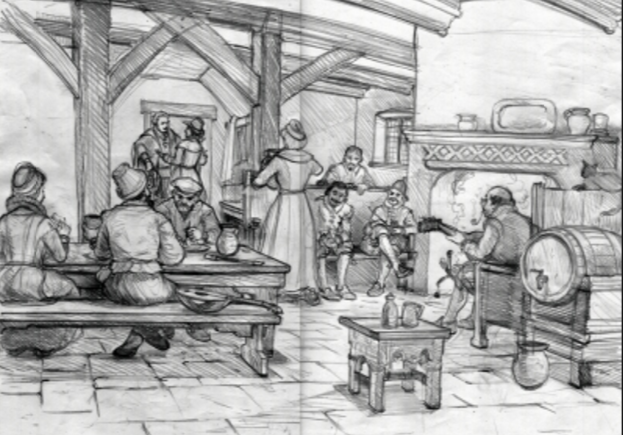
Taverns have been a staple in English society as a place for socializing, and a place to grab a beer or a stiff drink.
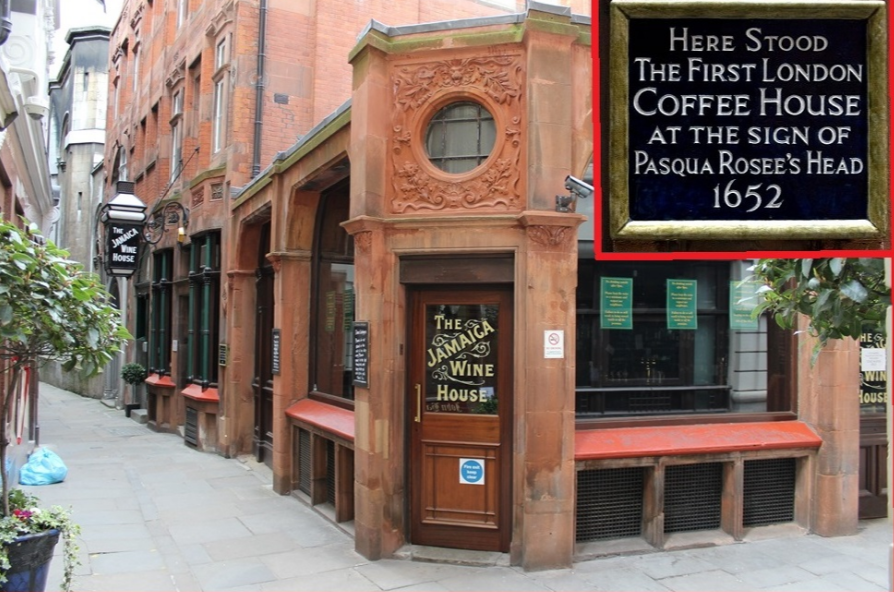
Since the opening of the first coffeehouse called St. Michael's Alley Coffeehouse in 1652, the Coffeehouse has played an important role in English society, in terms of a new place to socialize or to have a hot drink instead of a cold one, or a place to congregate without getting intoxicated.
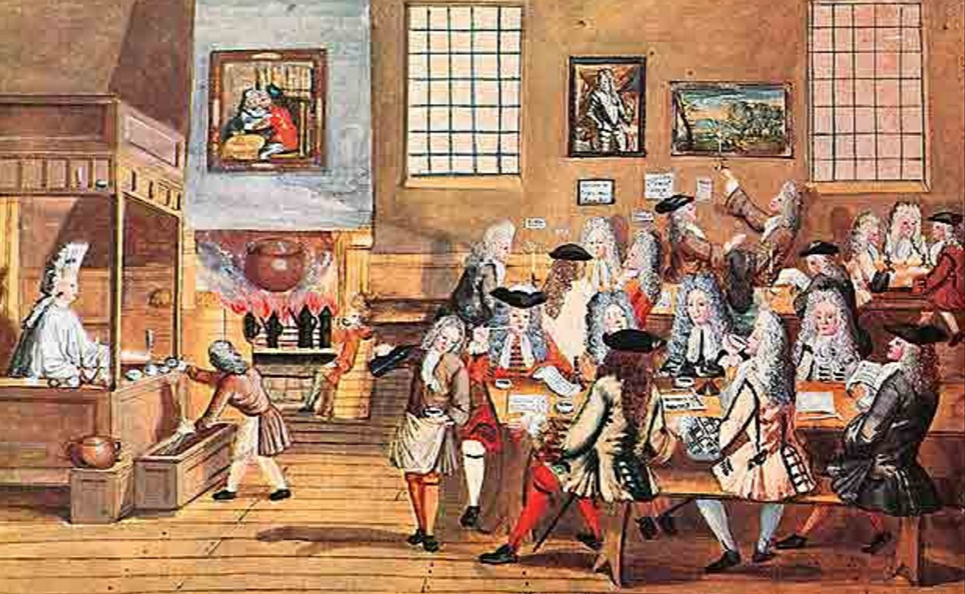
Many Coffeehouse’s have sprung up since 1652 selling tea, hot chocolate, and of course, their signature drink coffee. Despite the difference in drinks found at each of these establishments, these businesses are well known for fraternizing and socializing over the daily news or debating current events. The advent of the Coffeehouse initially took away from the market share of taverns by decreasing its patronage. After further evaluation of a primary source from 1675, an unwritten agreement was made between the two owners in an effort to split the market share evenly by distinguishing certain social classes and demographics that would go to either a tavern or a Coffeehouse.
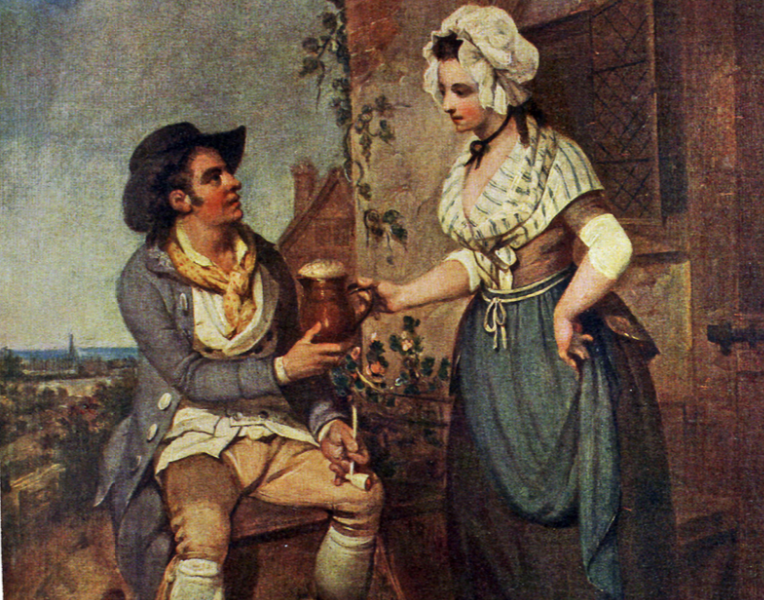
In the primary source entitled “Ale-wives complain against coffee-houses”, there is a heated debate between a female Ale House owner and a male coffeehouse owner. The woman that owns the Ale House accuses the owner of the Coffeehouse of taking a part of her market share, which is drastically hurting her in terms of revenue and is hampering her ability to make ends meet.
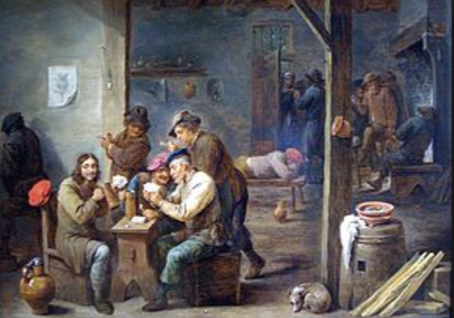
The female tavern owner admits that she has gone up words of two weeks without making a single sale. She explains how her revenue has declined sharply stating “journeymen tailors, old women, or nurses” make up her current clientele, and many of her old patrons have now become Coffee-house enthusiasts. The Ale House owner lost most of her male patrons to the Coffeehouse which became a phenomenon during the mid-17th century. The fanatical craze for coffee was sweeping the nation of England as the Coffee-house became the new social Mecca for debating key issues and socializing with friends.
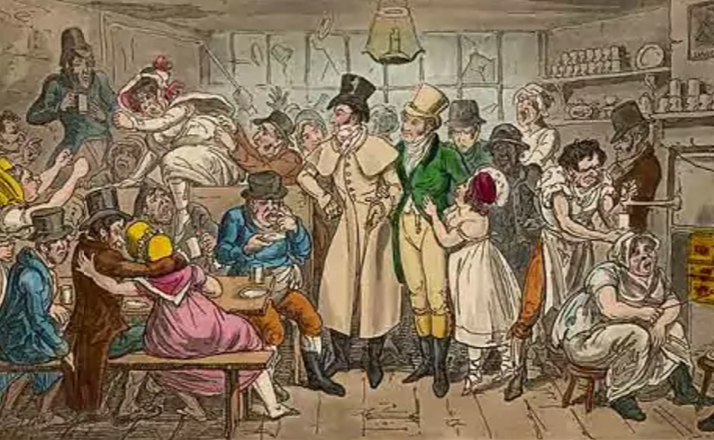
The Ale House owner was disgusted by this revelation by stating that “neighborhood swarm thither like Bees, but return light drones” which would emphasize a hive mentality among the patrons of the Coffeehouse as they discuss important matters of the day. It would also dispel that the London populace has lost some of its interest for intoxicating beverages, and are now enjoying caffeinated drinks that allow them to spark of wild conversations that go on even in the middle of the night.
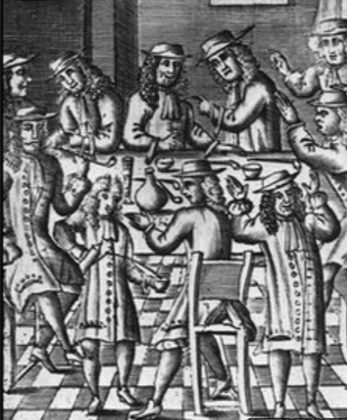
This angered the Ale House owner because her prime business hours were in the evening and now the Coffeehouse was taking those customers away. An example of citizens of London attending coffee houses in the evening is seen in the diary of Samuel Pepys. In a Saturday, January 14 entry from 1660, Mr. Pepys discusses having a dinner date with a friend Mr. Moore. After dinner Mr. Pepys and his wife went to a coffeehouse where he “heard exceedingly good argument against Mr. Harrison’s assertion, property was a foundation of government”, dispelling that London citizens did attend the Coffee-house in the evenings to talk politics.
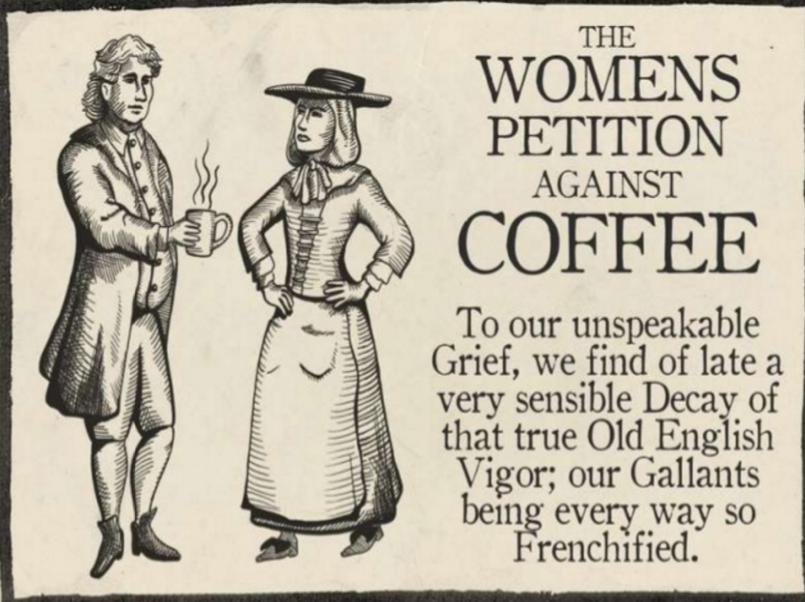
The Ale House owner felt that the Coffeehouse was breaking down the social fabric of the community by taking away the past time that was deeply rooted in the social fabric of London, which was drinking alcohol. Along with feeling robbed of her livelihood and clientele, she accused the coffee shop owner of “debucht the old virtue of good fellowship” and their judgment is skewed because they seek coffee in a fanatical matter. The rebuttal of the Coffeehouse owner is that the Ale House takes advantage of individuals who are down on their luck or are in a depressed state of mind and need a self-esteem booster to forget their problems.
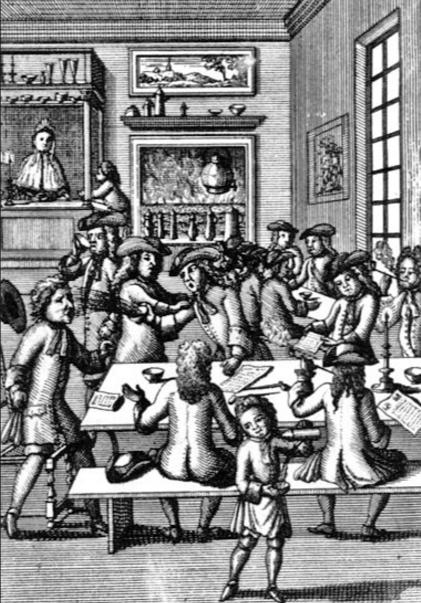
On the other hand, proponents of the Coffeehouse say that the Tavern is no place for gentlemen, and the Coffeehouse attracts intellectuals and those who are socially aware, hinting that the London populace is making a move towards modernity. Despite its effects on the London populace socially, coffee also had medical advantages as well.
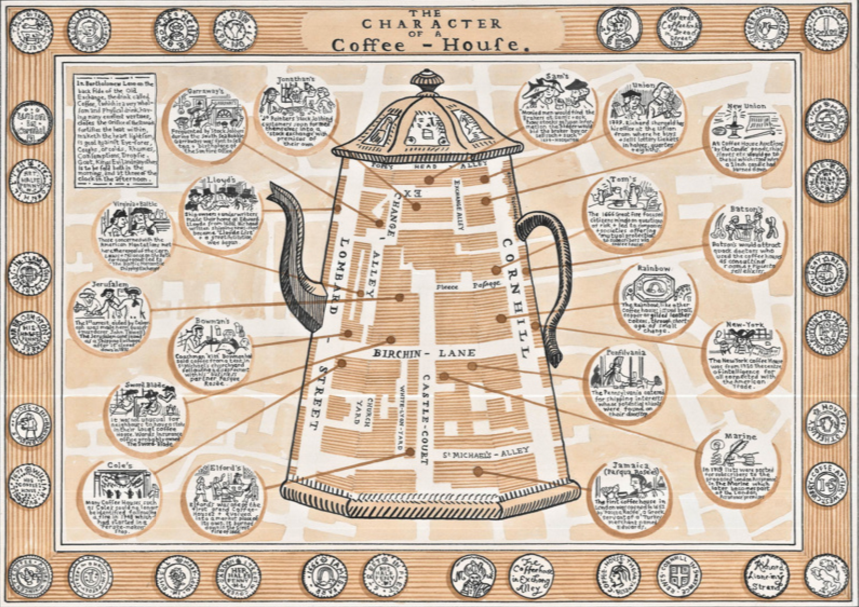
In a poem entitled “The character of a Coffeehouse”, it illustrates how coffee is an elixir to alleviate drunkenness by stating “it has such reviving power” helping an individual sober up from a drunken state. Even in the middle of the 17th century, the populace of London was aware of the sobering effects coffee had on those who were experiencing a hangover, or trying to sober up from too much alcohol. The Ale House owner then started to question the character and origin of coffee and tea. She made statements such as “infernal spirits than fit drinks for honest mortals” suggesting that the native lands were the coffee bean and tea leaves originate are only fit for those with an inferior racial composition. Regardless of each owner’s persistent advocating for their respective business, they both tried to put a moralistic justification to their beverage stating that it brought joy from a social standpoint for the London populace, while denouncing the competition by implying they don’t accentuate good fundamental characteristics of the London populace.
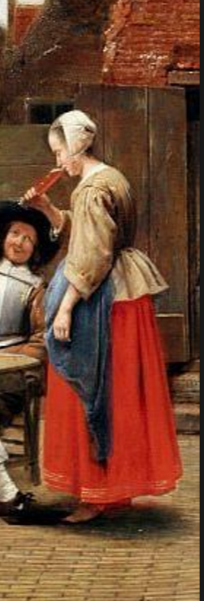
While the Ale House owner was making her case against the coffeehouse for taking the majority of our customers, detractors from the religious community were busy making their case against the consumption of alcohol. Sermons by the Puritan Samuel Ward of Ipswich started to shed a different light that inebriated individuals lose their good fellowship as he states “wine is a rager and tumultuous, a mocker, a make-bate” causing good men to act out of character and do things without good judgment.
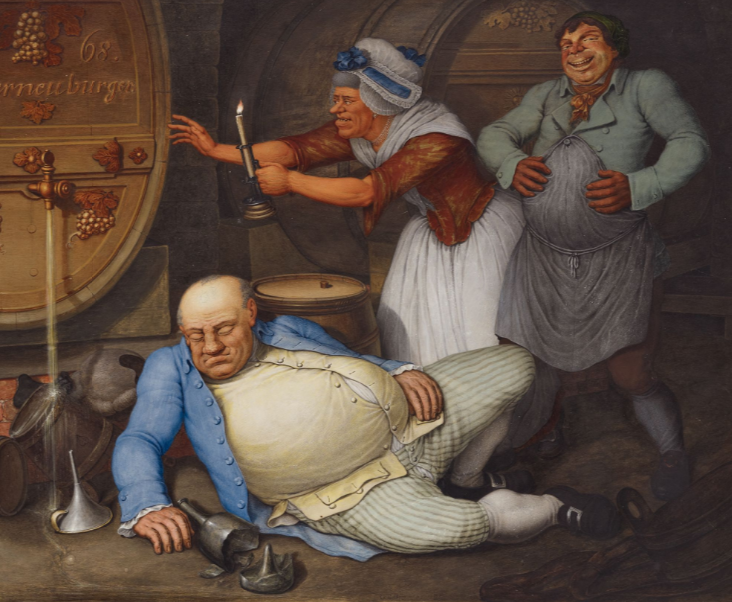
He then went on to say the sins of alcohol not only taints a man’s character but it also taints one soul as well. He exemplifies this point by stating that those who drink alcohol excessively become a “slave and pray to Satan and his snares” and are susceptible to falling under the control of the devil in committing wicked acts. He then goes on to speak about the effects of alcohol in the mindset of humors, speculating that alcohol subsides men’s ability to be hot and dry by stating “the devil has moistened”, and since alcohol changes a man’s biological chemistry, it can make him susceptible to the devil as he “shapes him like soft clay” and use him as a tool for wickedness. Essentially Samuel Ward makes a case from a religious standpoint that excessive alcoholism leads a man to act in moral and unethically, lacking the restraint of a gentleman, and follows the characteristics of a heathen. This mindset during the 17th century furthermore help advocate less drinking and increased the patronage of coffee houses throughout the London area.
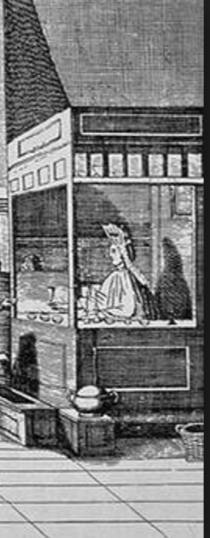
The Coffeehouse owner was willing to make some concessions to the Ale House owner as he took her financial plight in consideration. The two of them decided upon an unwritten agreement that would not infringe on each other’s business practice, and allow for an equal share of the marketplace. In the agreement the populace was segmented into different demographics according to social status, this helped establish who would frequent either of the two businesses. The first proposal was on the initiative to keep out the undesirable and less educated from Coffeehouses as is stated: “neither written or read shall be admitted into any Coffeehouse” in an attempt to maintain the intellectual integrity of the coffee houses debates, and applying a sense of social status to Coffeehouses. These individuals who are illiterate are left to frequent Ale Houses, and no longer permitted inside of Coffeehouses. Those that frequent Ale Houses who are fully inebriated beyond their ability to make good judgments or unable to comprehend allowed access to Coffeehouses.

These individuals are permitted into Coffeehouse to be “entertained in a Coffeehouse to make himself sober” because coffee drinking alleviated drunkenness, those who were feeling the symptoms of excessive alcohol con-sumption could stop at the Coffeehouse. From the standpoint of humors, Quakers were permitted to attend ale houses “if he be a wet Quaker” to dry himself out because a man during this time period must be hot and dry for me humors standpoint. This will unwritten agreement between the two businesses owners not only allowed for each of their businesses to thrive within the marketplace, but it also set in motion the construct of modern society in London.
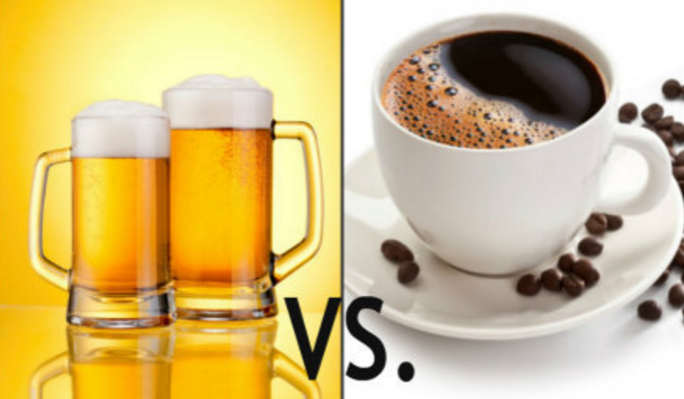
The quarrel between the Ale House owner and the Coffeehouse owner dispelled many of the social characteristics of the patrons who frequent these respective establishments. Each of these businesses played an integral role in the social fabric of each of their communities. A difference in opinion over the merit of each of their respective products only stems from financial discrepan-cies. After each party was able to announce their grievances and reach a set-tlement, they helped establish the initial framework for modern society in London.
• Sources: Early English Books Online. “The Ale-wives Against the Coffee-Houses” N.d. MS. 16 Apr. 1675. 1 Web.
• Pepys, Samuel. "The Diary of Samuel Pepys." The Diary of Samuel Pepys. N.p., n.d. Web. 14 Jan. 1660.
• The Character of a Coffee-House." (1673): 1. WorldCat [OCLC]. 3. Web.
• Ward, Samuel. "A Wo to Drunkards." N.d. TS 23, 29,32. Ips-wich 3.
• Early English Books Online. “The Ale-wives Against the Cof-fee-Houses” N.d. MS. 16 Apr. 1675. 6 Web.

If you enjoyed my work

All proceeds from upvotes on this post are going to more Steem Power.
